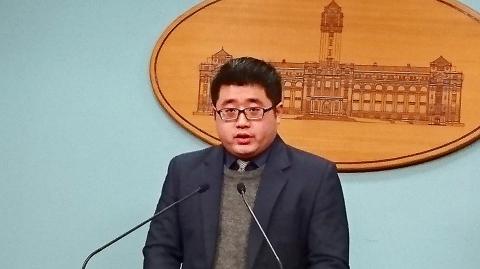The Presidential Office yesterday said it was not consulted before the preparatory committee for the National Congress on Judicial Reform decided to drastically reduce the number of Supreme Court judges and give the president the power to appoint judges without legislative approval.
“President Tsai [Ing-wen (蔡英文)] has always supported judicial independence. Her resolve and stated position on this matter need not be questioned,” Presidential Office spokesman Sidney Lin (林鶴明) said.
Tsai serves as the convener of the committee and there are five sub-committees.

Photo: Chung Lee-hua, Taipei Times
“Members of the preparatory sub-committees have been meeting to deliberate on the thematic issues assigned to each of them,” Lin said, adding that the issues were compiled during an open call for input by various sectors of society and then consolidated by committee members.
“As such, we respect each committee member’s judgement and have given them room for discussion to allow them to fully express their views and ideas,” he said.
As for the process of appointing judges to the Supreme Court and the Supreme Administrative Court, members of the judicial reform committee did not make consultation, nor did they seek the Presidential Office’s opinion, Lin said.
“The president believes that issues related to presidential powers and mandated duties should be treated carefully, in a prudent way,” Lin said, adding that the issue would be further evaluated in the final committee session.
During a meeting of the committee on Monday a consensus was reached that the top level of the judiciary should be reduced by cutting the combined number of Supreme Court and Supreme Administrative Court judges from 94 to 21, and granting the president the power to make final selection of the judges without going through legislative approval.
At present, the Judicial Yuan nominates and appoints top-level judges.
Under the proposal, the Judicial Yuan president would nominate 63 candidates — three times the required number of judges — and a screening committee would then narrow the list to 42 and the president would select candidates from the shortlist.
Critics and opposition party lawmakers have accused Tsai of seeking to expand her powers and interfere with judiciary’s independence.
However, the Judicial Yuan on Tuesday said that the proposal aims to bring the nation more in-sync with the judicial systems in other countries.
Reached for a comment yesterday, former president Ma Ying-jeou (馬英九) urged his successor to be cautious in handling the issue, saying that Taiwan should not randomly copy foreign systems.
Additional reporting by CNA

A magnitude 4.9 earthquake struck off Tainan at 11:47am today, the Central Weather Administration (CWA) said. The hypocenter was 32.3km northeast of Tainan City Hall at a depth of 7.3km, CWA data showed. The intensity of the quake, which gauges the actual effect of a seismic event, measured 4 in Tainan and Chiayi County on Taiwan's seven-tier intensity scale, the data showed. The quake had an intensity of 3 in Chiayi City and County, and Yunlin County, while it was measured as 2 in Kaohsiung, Nantou County, Changhua County, Taitung County and offshore Penghu County, the data showed. There were no immediate reports of

The Chinese Nationalist Party (KMT) is maintaining close ties with Beijing, the Democratic Progressive Party (DPP) said yesterday, hours after a new round of Chinese military drills in the Taiwan Strait began. Political parties in a democracy have a responsibility to be loyal to the nation and defend its sovereignty, DPP spokesman Justin Wu (吳崢) told a news conference in Taipei. His comments came hours after Beijing announced via Chinese state media that the Chinese People’s Liberation Army’s Eastern Theater Command was holding large-scale drills simulating a multi-pronged attack on Taiwan. Contrary to the KMT’s claims that it is staunchly anti-communist, KMT Deputy

Weather conditions across Taiwan are expected to remain stable today, but cloudy to rainy skies are expected from tomorrow onward due to increasing moisture in the atmosphere, according to the Central Weather Administration (CWA). Daytime highs today are expected to hit 25-27°C in western Taiwan and 22-24°C in the eastern counties of Yilan, Hualien, and Taitung, data on the CWA website indicated. After sunset, temperatures could drop to 16-17°C in most parts of Taiwan. For tomorrow, precipitation is likely in northern Taiwan as a cloud system moves in from China. Daytime temperatures are expected to hover around 25°C, the CWA said. Starting Monday, areas

RESPONSE: The government would investigate incidents of Taiwanese entertainers in China promoting CCP propaganda online in contravention of the law, the source said Taiwanese entertainers living in China who are found to have contravened cross-strait regulations or collaborated with the Chinese Communist Party (CCP) could be subject to fines, a source said on Sunday. Several Taiwanese entertainers have posted on the social media platform Sina Weibo saying that Taiwan “must be returned” to China, and sharing news articles from Chinese state media. In response, the Mainland Affairs Council (MAC) has asked the Ministry of Culture to investigate whether the entertainers had contravened any laws, and asked for them to be questioned upon their return to Taiwan, an official familiar with the matter said. To curb repeated